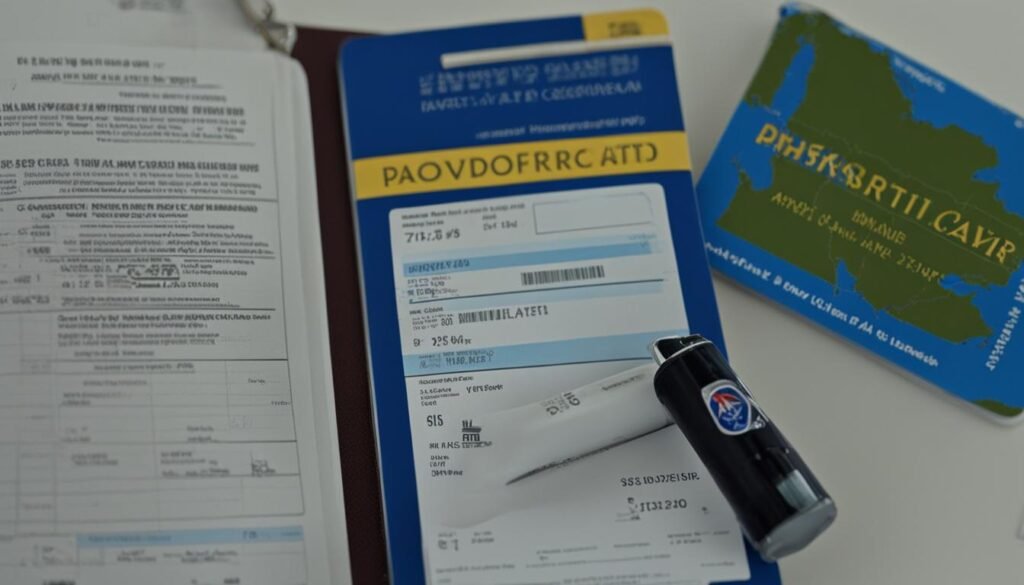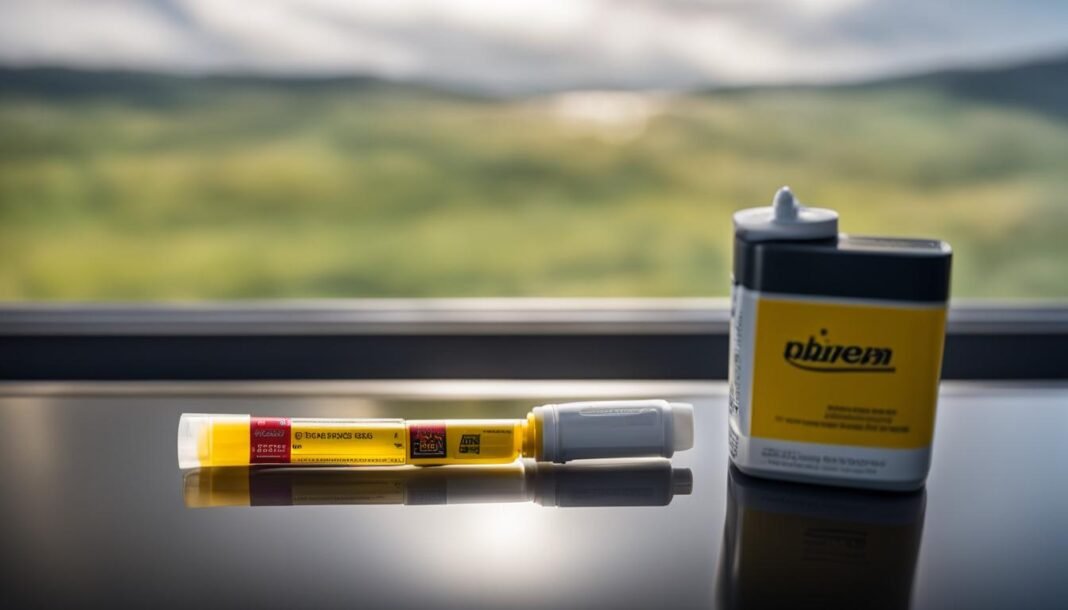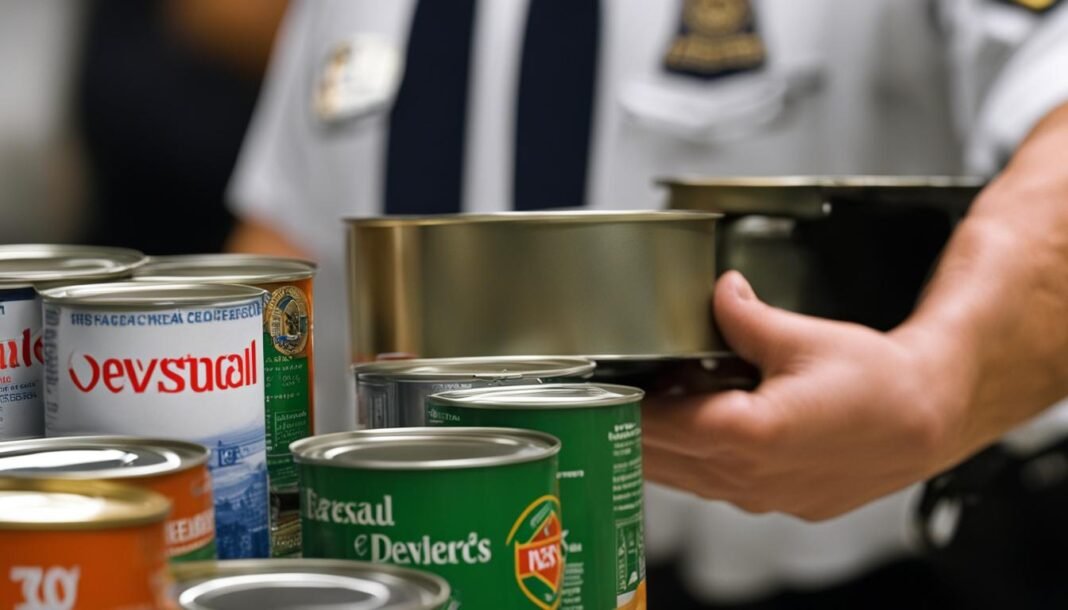According to TSA regulations, passengers are allowed to bring inhalers on a plane when traveling. Inhalers are considered essential medical items and are exempt from the 3-1-1 liquids rule.
It is important to keep the inhaler in your carry-on bag and ensure that it is easily accessible for screening. Having a copy of the prescription or a letter from a doctor can validate the need for the inhaler during security checks.
Table of Contents
Key Takeaways:
- Passengers can bring inhalers on a plane as they are considered essential medical items.
- Inhalers should be packed in a carry-on bag and easily accessible for security checks.
- Having a copy of the prescription or a letter from a doctor can help validate the need for the inhaler.
- Ensure that the inhaler is within its use-by date and consider carrying a spare inhaler.
- Consult with the airline if specific equipment is required for managing asthma during the flight.
Can You Bring an Inhaler on a Plane? Guidelines for Traveling with an Inhaler

When traveling with an inhaler, it is important to be prepared and follow certain guidelines. Ensuring you have your medication readily available can help prevent any complications during your journey.
Visiting a Doctor Before Your Trip
Before you embark on your journey, it is highly recommended to schedule a visit with your doctor. This is a crucial step to discuss any additional medication that may be needed and obtain a signed letter confirming your asthma diagnosis and prescribed medications. Having this documentation will ensure a smooth experience when going through security checks.
Carrying Medication as Hand Luggage
All asthma medication should be carried as hand luggage to avoid loss or damage. The Transportation Security Administration (TSA) permits passengers to bring necessary medications, including inhalers, in their carry-on bags. It is crucial to pack your inhaler, along with a spare, in its original packaging with the prescription label and contact details of the pharmacy clearly visible. This ensures compliance with regulations and easy identification during security checks.
Carrying Extra Inhalers
It is advisable to carry extra inhalers to be prepared for any unforeseen circumstances. Make sure the inhalers are within their use-by date to ensure their effectiveness. Keeping spare inhalers can provide peace of mind and prevent any potential emergencies.
Having an Asthma Action Plan
Creating a personal asthma action plan and carrying an asthma attack card is essential when traveling. These resources outline steps to manage worsening symptoms or triggers during your journey. Collaborate with your doctor to develop an action plan tailored to your needs, including recommended medications and emergency contact information.
Traveling with an Inhaler Checklist
| Guidelines | Checklist |
|---|---|
| Schedule a doctor’s visit | ✔️ |
| Obtain a signed letter and prescriptions | ✔️ |
| Carry inhaler as hand luggage | ✔️ |
| Ensure inhaler is in its original packaging | ✔️ |
| Have spare inhalers | ✔️ |
| Create an asthma action plan | ✔️ |
By following these guidelines, you can confidently travel with your inhaler knowing that you are prepared to manage your asthma effectively throughout your journey.
Dealing with Asthma on the Plane
In the event of an asthma attack on the plane, individuals with asthma need to be fully prepared and aware of their triggers. While cabin crew members are trained to respond quickly and appropriately, it is important to remember that they are not healthcare professionals.
Therefore, travelers must have a clear understanding of their asthma symptoms and be equipped with the necessary knowledge and tools to manage an asthma attack while in the air.
Depending on the severity of asthma, it may be necessary to undergo a fitness-to-fly assessment or use in-flight oxygen as advised by a doctor. In-flight oxygen can provide immediate relief and aid in stabilizing the condition during an asthma attack.
Individuals with asthma should consult with their healthcare provider before air travel and discuss the possibility of using in-flight oxygen if needed.
If specific equipment, such as a peak flow meter or a nebulizer, is required to manage asthma symptoms, it is important to communicate with the airline in advance. Airlines may have specific regulations and guidelines regarding the use of medical equipment on board.
By informing the airline beforehand, individuals with asthma can ensure that they are compliant with the airline’s policies and have the necessary equipment readily available during the flight.
“Traveling with asthma requires careful planning and preparation. By understanding your triggers, consulting with your healthcare provider, and communicating with the airline, you can effectively manage your asthma and have a safe and comfortable journey.”
Travel Checklist for Dealing with Asthma on a Plane:
- Consult with your healthcare provider before your trip to discuss asthma management and potential risks associated with air travel.
- Carry a sufficient supply of asthma medication in your carry-on bag, along with a spare inhaler and any other necessary equipment.
- Ensure your medication is properly labeled and packed in its original packaging.
- Have a copy of your prescription or a letter from your doctor that validates the need for your asthma medication.
- Be familiar with your emergency action plan for managing asthma attacks.
- If required, undergo a fitness-to-fly assessment and discuss the possibility of using in-flight oxygen with your healthcare provider.
- If specific equipment is needed, inform the airline in advance to ensure compliance with their regulations.
Additional Tips for Asthma-Friendly Travel
When planning a trip, individuals with asthma should consider several factors that can impact their condition. One important consideration is the effect of altitude and weather conditions on asthma symptoms.
High altitudes and extreme temperatures can trigger asthma attacks, so it is crucial to plan activities accordingly and consult with a healthcare professional before engaging in strenuous physical activities.
Another factor to take into account is air pollution. Poor air quality can worsen asthma symptoms, so it may be advisable to avoid destinations with high levels of air pollution. Researching the air quality of your desired travel location can help you make an informed decision.
In addition to these considerations, individuals with asthma should also carefully select accommodations that prioritize their needs. Non-smoking accommodations with reliable air conditioning can ensure a more comfortable environment.
Choosing accommodations located away from heavily trafficked areas can further minimize exposure to potential triggers.
Lastly, individuals with asthma must have appropriate travel insurance in place. This ensures that if any medical assistance is needed, it can be obtained promptly, providing peace of mind during the trip.
Continue Reading:
- Can You Bring An Epipen on a Plane?
- Can You Bring an Air Mattress on a Plane?
- Can You Bring a Tripod on a Plane?
- Can You Bring a Tent on a Plane? Flying with Camping Gear
- Can You Bring a Screwdriver on a Plane?
- Can You Bring a PS5 on a Plane?
- Can You Bring a Pipe on a Plane?
- Can You Bring a Pencil Sharpener on a Plane?
- Can You Bring a Parachute on a Plane? Tips & Rules
- Can You Bring a Cigar Cutter on a Plane?
Frequently Asked Questions
Can I bring my inhaler on a plane?
Yes, you can bring your inhaler on a plane. The Transportation Security Administration (TSA) allows passengers to carry inhalers in their hand luggage as they are considered essential medical items and are exempt from the 3-1-1 liquids rule.
Do I need to pack my inhaler in my carry-on bag?
Yes, it is recommended to pack your inhaler, along with a spare, in your carry-on bag. This ensures that they are easily accessible for screening and prevents loss or damage.
Should I have a copy of the prescription or a letter from my doctor when traveling with an inhaler?
It is advisable to have a copy of the prescription or a letter from your doctor to validate the need for the inhaler during security checks.
What other medication should I carry when traveling with asthma?
It is recommended to visit a doctor before your trip to discuss any additional medication that may be needed. You should carry all asthma medication as hand luggage. Medication should be in its original packaging with the prescription label and contact details of the pharmacy clearly visible.
Are cabin crew members trained to respond to an asthma attack on a plane?
Yes, cabin crew members are trained to respond quickly and react appropriately to an asthma attack on a plane. However, individuals with asthma should be aware of their triggers and understand their emergency action plan.
Can I use specialized equipment such as a peak flow meter or a nebulizer on a plane?
If specific equipment such as a peak flow meter or a nebulizer is required, it is advisable to consult with the airline beforehand to ensure compliance with their regulations.
How can I manage my asthma during the flight?
Depending on the severity of your asthma, it may be necessary to undergo a fitness-to-fly assessment or use in-flight oxygen as advised by a doctor. It is important to have an asthma attack card and a personal asthma action plan in place to manage any worsening symptoms or triggers during the journey.
What should I consider when planning a trip with asthma?
When planning a trip with asthma, it is important to consider the impact of altitude, weather conditions, and air pollution on your condition. Consult with a healthcare professional before engaging in strenuous physical activities at high altitudes or extreme temperatures. Avoid countries with high air pollution levels and choose non-smoking accommodations, that have air conditioning, and are located away from heavy traffic areas.
Should I have travel insurance for my asthma?
Yes, it is essential to have appropriate travel insurance in place to ensure prompt medical assistance if needed during your trip.


